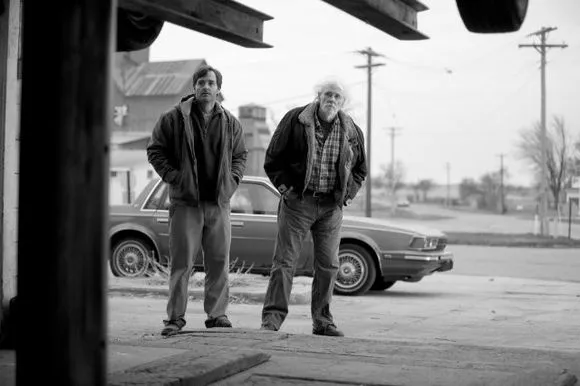Nebraska

Plot
Nebraska, the 2013 black-and-white film directed by Alexander Payne, is a poignant and witty exploration of the complexities of family dynamics, relationships, and the human condition. The movie follows Woody Grant (Bruce Dern), a 70-year-old man who has lost touch with reality and his own identity. Woody's life revolves around drinking and playing bingo, struggling to connect with the world around him. On one fateful day, a mistaken letter from Nebraska informs Woody of his being the winner of a million-dollar sweepstakes prize for his "Free Money" scratch-off ticket. Enraged and determined, Woody decides to embark on a perilous 700-mile journey from Billings, Montana to Lincoln, Nebraska, with the hope of collecting his winnings. His son, David (Will Forte), who has recently moved to Lincoln, reluctantly agrees to accompany his father on this ill-fated adventure. Throughout their journey, Woody and David are presented with the harsh realities of small-town American life, encountering a world that has moved significantly beyond Woody's own understanding. They traverse through quaint, rural landscapes, visiting various towns, and meeting a cast of eccentric characters. Each person they meet only serves to highlight the generational divide between Woody and David. These characters, often portrayed with a dash of satire, embody the struggles and limitations of life in small communities, further emphasizing the distance between Woody's and David's realities. Woody's motivations for this trip are complex, driven in part by his own self-delusions and also a deep-seated desire to reassert his authority and control over his family. Over the years, Woody's behavior has pushed away those he cares about, and his actions in this film serve as a cry for attention. His son's reluctant participation serves to underscore the depth of their complicated relationship and the reasons behind their estrangement. Through their interactions with other characters, Woody's character undergoes a transformation. His initial confidence and optimism gradually give way to an admission of uncertainty and vulnerability. His perceptions of reality begin to shift as he confronts the truth about his sweepstakes winnings and the reasons behind his journey. In these pivotal moments, the film masterfully interweaves the narrative of Woody's life, revealing the long history of strained relationships with family members. David, in his own right, also undergoes significant growth, confronting his own feelings about his father. David is driven by both a sense of obligation and a need to reconnect with the man he has been estranged from. As he travels with Woody, he begins to understand the depth of his father's emotional pain and the reasons behind Woody's reckless behavior. In doing so, David comes to see his father as a man, rather than a caricature of a stubborn and often inconsiderate individual. One of the supporting characters, Kate Grant (June Squibb), provides a rich dynamic to the story. As Woody's wife, the couple's history of marital infidelity, domestic violence, and emotional unavailability is skillfully woven into the narrative. This adds depth to Woody's character and underscores the complexity of their relationship, as Kate's reactions reveal her enduring love for Woody despite his flaws and mistreatment. Ultimately, Woody and David's odyssey serves as a powerful exploration of the intricate web of family relationships, as well as a poignant commentary on the struggles faced by seniors in America. As the two characters face the truth about Woody's sweepstakes prize, their experiences reveal the importance of forgiveness, understanding, and reconciliation. The film culminates with a bittersweet denouement that serves as a poignant reminder of the enduring impact that our relationships can have on our lives.
Reviews
Recommendations





